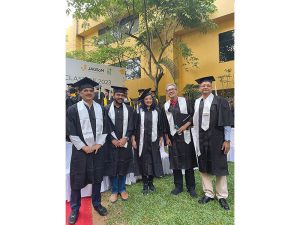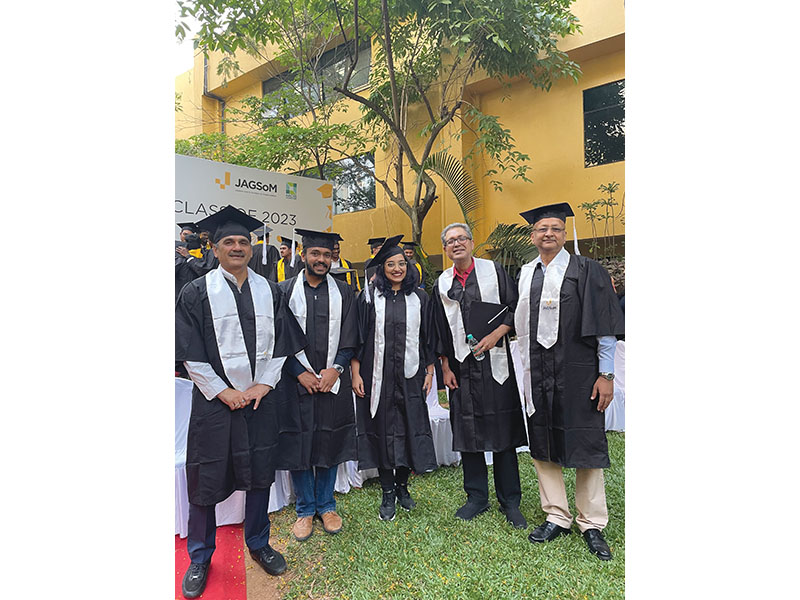21 Higher education leaders racing to develop india’s high-potential human resource: Sanjay Padode
Sanjay Padode
President, Vijaybhoomi University, Karjat (Maharashtra)

An engineering and math postgraduate of BITS- Pilani, Sanjay Padode is Chairman of the Center for Development Education, a Bengaluru-based not-for-profit, which runs and manages the Jagdish Sheth School of Management (JAGSOM) and Vijaybhoomi University, Karjat (estb.2019).
What are the major objectives set for your higher ed institutions until India’s Freedom Centenary year in 2047?
Our main objective is to nurture holistic, socially responsible, and continuously employable professionals. To attain this objective, our endeavour is to provide students with opportunity to discover their passions and align them with their career aspirations. We believe that pursuing one’s passion automatically leads to excellence and value creation for society. Therefore, we need to provide all students with bespoke learning pathways aligned to their passion and aptitude by 2047.
How satisfied are you with your progress thus far?
We have been successful in implementing bespoke learning in Vijaybhoomi University and JAGSOM. Starting with psychometric tests to help students identify their strengths and weaknesses and continuous mentoring by faculty and external mentors, we have witnessed students acquire courage choosing unconventional learning pathways which have delivered success and satisfaction. This has encouraged us to strive to improve this pedagogy. We are confident that our education philosophy will soon be followed by many.
What are your major initiatives to contemporise your syllabus/curriculum?
Most institutions are focused on providing coursework aligned with degrees and diplomas that they award. This is an educator-centric approach. Our policy is to provide learning choices to students and motivate them to follow learning pathways of their choice. Besides this, we encourage our students to develop a portfolio of ‘doings’ — accomplishing learning. We believe that a portfolio of practice work demonstrates a student’s capability far better than a one-size-fits-all degree. Thus our curricula require 33 percent of knowledge building, 33 percent skills building through knowledge application, and 33 percent of personality enhancement and life skills building.
How satisfied are you with your connect with Indian industry and business?
We are aggressive in engaging with the practice world. We leverage corporate experience and knowledge for continuously enhancing and aligning our curriculum to the needs of India Inc. We routinely invite business and industry professionals to mentor our students and expose them to real-life problems and situations. This is supplemented by industry internships and projects. We have never experienced lack of cooperation from industry and business, and are very satisfied with their response and knowledge sharing.
R&D and innovation are widely perceived as Indian academia’s infirmity. What’s your institutional response to create new knowledge?
For us, research is very important to ensure that our faculty maintains currency of knowledge and provides relevant skills to our students. To this end, practice courses are mandatory for all. We also have a research incubation programme in which every student is exposed to research methodologies and presentation/documentation of their papers for peer review and appreciation. Of course, research is a crucial component of preparing students for the future, but we don’t believe in research for the sake of enhancing our count of publications. We prefer research and innovation that delivers impact and solves problems prevailing in our society.
What’s your prescription for transforming India into a $30 trillion GDP economy by 2047?
We need to allow our youth to learn what they want to learn. We have a huge population of youth in our country and their number spans and covers every profession that exists in the world today. We should allow our students to pursue their passions and strive for excellence. This will not only drive India’s economic growth to meet the US $30 trillion target, it will also make our youth satisfied and happy. A sustainable future for the country requires India to become prosperous without strife and friction. Thus happiness and satisfaction should also be pursued as an important metric whilst chasing number targets.
Also Read: Vijaybhoomi University Unveils Thrilling Trailblazer Program

















Add comment